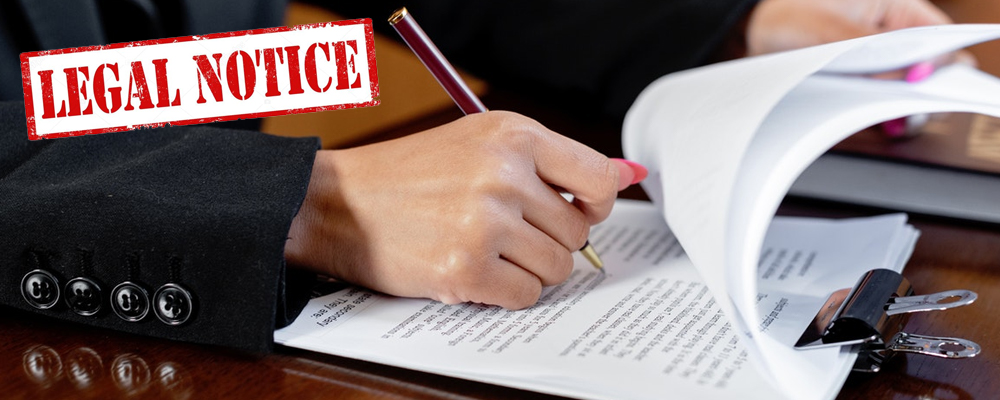Every person who engages in official communication is required to adhere to a pre-established agreement. This pre-arranged configuration is referred to as a format. One example of a formal communication with its own structure that specifies how and what information must be included in the communication is a legal notice.
Legal documents are very significant and require many delicate details that are challenging for a layperson to put together. A legal notice is a document that a lawyer sends to a person (legal or natural) on the orders of his client, and through it, the receiving party is informed of the intention of the party giving the notice to file a lawsuit against them for the problems and difficulties they have experienced.
Each individual whose right has been infringed upon by another may send a legal notice. A legal notice is regarded as the initial step in a legal procedure in India. The best Supreme Court attorneys in India frequently believe and assert that practically every legal action in India is founded on a legal notice.
Cases in which mostly Legal Notices are sent:
- Property disputes
- Notice by employer
- An employee’s notice
- A bounced check
- Contract breach
- Consumer grievances
- Recovery of money
For each of the aforementioned instances, the legal notice format is the same. Although it can also be sent personally, notice is typically delivered via registered mail. An increasing number of people are issuing legal notices online these days. However, it has the same impact as a notice that is hand-delivered or mailed. A legal notice’s primary goal is to notify the other party of the intention to file a lawsuit.
Need A Legal Advice
The internet is not a lawyer and neither are you. Talk to a real lawyer about your legal issue

Importance of filing Legal Notice:
Courts are currently overloaded with cases. Because of this, litigation is currently the only choice for anyone hoping for a quick resolution to their problem. A formal legal proceeding takes time and money to complete. As a result, a legal notice must always be submitted before filing a case. It’s crucial to submit a legal notice for the following reason:
a) The plaintiff can express his complaints to the recipient in detail through a legal notice.
b) To avoid a formal legal process, the notice recipient may address those complaints.
c) Without going through the trouble of legal proceedings, the issue can be resolved outside of it.
d) Parties have the chance to use Alternative Dispute Resolution processes after receiving legal notice.
The law regarding Legal Notice:
Only in civil cases is a legal notice filed. In criminal proceedings, the government is the one who takes legal action against the offender. However, Section 80 of the Civil Procedure Code makes delivering a legal notice necessary when a lawsuit is brought against the government or a public official. It states that:
- If a lawsuit is brought against a federal or state agency, the secretary of that agency or the district collector should be served with notice;
- The General Manager will receive notification of the lawsuit if the railroad is the defendant;
- If the complaint is brought against the Government of Jammu and Kashmir, the Chief Secretary to the government or any other authorized person would be served with the notice;
- The notice should be delivered to the public official or left at his office if the lawsuit is brought against them.
A two-month window is given to the Government or the officer who receives the notification to come to an agreement. A formal legal process can be started against them if they do not comply. This enforceable condition is intended to deter baseless claims against the government.
Advantages of filing Legal Notice:
- A conversational communication may not be as effective as a legal notice in obtaining the desired outcome. Therefore, the parties may come to an understanding through the preparation of a notice and/or a reply in response to a legal notice.
- Once a reply is received, any lingering uncertainty about the intentions is cleared up. If the notification is not responded to within the allotted time, it is obvious that the recipient party took the notice carelessly, and further legal corrective action may be taken.
- The fact that a legitimate relief was requested from the receiving party before going to court is documented in writing. The notice may also be attached to court documents and referred to in court proceedings.
An essential tool for communication between the parties is a legal notice. A properly written legal notice can force the parties to settle their differences without having to go through the formality of a formal court case, which can save time and money. A consumer may issue their own legal notice, but only qualified individuals should issue legal notice.





 Talk to a Lawyer
Talk to a Lawyer